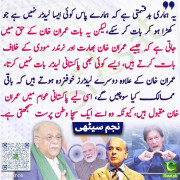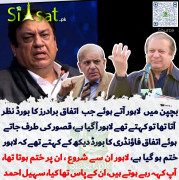Re: NO COMMENTS: 59th Birthday Celebrations for Hafiz Dr Muhammad Tahir Ul Qadri
@
ahsanuck @
sngilani @
kaka1 @
biomat @
Believer12 @
karachiwala @
PAINDO
mere azeez bhaiyyo...apni saffon main ittehad rakhiye...
aapkay in ikhtelafaat ko dekh kar...intehapasand tanzeemon kay karkunaan bahut khushi mana rahay hain...aur musk musk ker rahay hain...
aap ghaur kerain aur post
#23 kay baad honay waali behes per nazar dorrain...
aur post
#45 per bhi (yeh shukhs Aanhazrat mohammad e mostafa (s.a.w.) ki sunnat ki tazleel kernay walay shakhs ki tasveer lagaye huay hai)
kya iss sunnat ki aqeedat aap sab log nahi kertay?
kya aapki bilawaja ki behes aur tafarqay say faida kuch aisay ashkhaas to nahi uttha rahay jo muashray ko firqawarana bunyaadon per taqseem kerna chahtay hain...?
hoshyaar rahiye ga...
yeh na ho kay baad main aap pashtain kay humne ittehad kay bijaye mamooli say ikhtlafaat ki wajah say mulk gawa diya
warna aap main se koi aik bahadur shah zafar ki tarah nohay likh raha hoga
What is most sad in the issue is we Muslims have changed our religion just like Jews and Christians did. Time will come when we will sing songs in the masjids just like christians do in churches.
Please do not change the religion according to your desires. Our religion is complete and Prophet Muhammad (PBHM) was the last prophet.
Keep religion and world affairs separate and you will know the difference of adding news things to Islam.
عن عائشة قالت: دخل علي رسول الله وعندي جاريتان تغنيان بغناء بعاث فاضطجع على الفراش وحول وجهه ودخل أبو بكر فانتهرني وقال مزمارة الشيطان عند النبي فأقبل عليه رسول الله عليه السلام فقال دعهما فلما غفل غمزتهما فخرجتا
Narrates
‘A’ishah (rta): The Messenger (sws) of God came to my residence while two female singers were singing the songs of
Bu‘ath.
1 The Holy Prophet (sws) lay down and turned his face to the other side. Meanwhile
Abu Bakr (rta) entered and [seeing the singers] rebuked me thus: ‘Satanic musical instruments in the presence of the Holy Prophet (sws)?’ On hearing this God’s Messenger (sws) turned towards him and said: ‘Let them [sing and rejoice]’. When
Abu Bakr was engaged in some other business, I signaled to the girls [to go out] and they left. It was on the
‘Id day.
2 (
Bukhari, No: 907)
We can conclude from this narrative the following points:
The Mother of the believers,
‘A’ishah (rta), was listening to songs on
‘Id day.
The songs were being sung in the residence of the Holy Prophet (sws).
A professional singer was performing.
3
The song was not a hymn to God; rather a relic of a war fought before the advent of Islam.
The mother of the believers did not stop listening to the song even after the Holy Prophet had arrived.
The Holy Prophet (sws) did not forbid her from listening to the song.
He did not stop the female singers either.
He himself was not attracted to the performance but he must have heard the song as he could hear
Abu Bakr’s comments.
Abu Bakr (rta) condemned the practice at first sight and declared that these were satanic instruments.
When he tried to stop the singers and censure the listeners, the Holy Prophet (sws) stopped him from doing so.
The report evidently proves that the Holy Prophet (sws) allowed singing music during religious festivals. This is evidenced by the fact that Holy Prophet’s (sws) wife enjoyed singing and music. Although
Abu Bakr (rta) tried to stop the function, the Holy Prophet (sws) did not interfere with it, and let the performers and the audience enjoy themselves. Therefore, in light of this evidence we can conclude that music can justifiably be considered allowable in Islam.
The following narrative also deals with the issue:
عن أم سلمة قالت دخلت علينا جارية لحسان بن ثابت يوم فطر ناشرة شعرها معها دف تغني فزجرتها أم سلمة فقال النبي دعيها يا أم سلمة فإن لكل قوم عيدا وهذا يوم عيدنا
Umm-i-Salamah narrates: A slave girl belonging to
Hassan Ibn Thabit (rta) came to us on
‘Id al Fitr. Her hair was unkempt and she carried a tambourine and was singing [some song].
Umm-i-Salamah rebuked her. But the Holy Prophet (sws) said to her: ‘
Ummi-i-Salamah, let her [sing and rejoice]. Certainly every nation has an
‘Id and this day is our
‘Id’. (
Mu‘jam Al-Kabir, No: 558)
عن عائشة قالت: دخل علي رسول الله وعندي جاريتان تغنيان بغناء بعاث فاضطجع على الفراش وحول وجهه ودخل أبو بكر فانتهرني وقال مزمارة الشيطان عند النبي فأقبل عليه رسول الله عليه السلام فقال دعهما فلما غفل غمزتهما فخرجتا
Narrates
‘A’ishah (rta): The Messenger (sws) of God came to my residence while two female singers were singing the songs of
Bu‘ath.
1 The Holy Prophet (sws) lay down and turned his face to the other side. Meanwhile
Abu Bakr (rta) entered and [seeing the singers] rebuked me thus: ‘Satanic musical instruments in the presence of the Holy Prophet (sws)?’ On hearing this God’s Messenger (sws) turned towards him and said: ‘Let them [sing and rejoice]’. When
Abu Bakr was engaged in some other business, I signaled to the girls [to go out] and they left. It was on the
‘Id day.
2 (
Bukhari, No: 907)
We can conclude from this narrative the following points:
The Mother of the believers,
‘A’ishah (rta), was listening to songs on
‘Id day.
The songs were being sung in the residence of the Holy Prophet (sws).
A professional singer was performing.
3
The song was not a hymn to God; rather a relic of a war fought before the advent of Islam.
The mother of the believers did not stop listening to the song even after the Holy Prophet had arrived.
The Holy Prophet (sws) did not forbid her from listening to the song.
He did not stop the female singers either.
He himself was not attracted to the performance but he must have heard the song as he could hear
Abu Bakr’s comments.
Abu Bakr (rta) condemned the practice at first sight and declared that these were satanic instruments.
When he tried to stop the singers and censure the listeners, the Holy Prophet (sws) stopped him from doing so.
The report evidently proves that the Holy Prophet (sws) allowed singing music during religious festivals. This is evidenced by the fact that Holy Prophet’s (sws) wife enjoyed singing and music. Although
Abu Bakr (rta) tried to stop the function, the Holy Prophet (sws) did not interfere with it, and let the performers and the audience enjoy themselves. Therefore, in light of this evidence we can conclude that music can justifiably be considered allowable in Islam.
The following narrative also deals with the issue:
عن أم سلمة قالت دخلت علينا جارية لحسان بن ثابت يوم فطر ناشرة شعرها معها دف تغني فزجرتها أم سلمة فقال النبي دعيها يا أم سلمة فإن لكل قوم عيدا وهذا يوم عيدنا
Umm-i-Salamah narrates: A slave girl belonging to
Hassan Ibn Thabit (rta) came to us on
‘Id al Fitr. Her hair was unkempt and she carried a tambourine and was singing [some song].
Umm-i-Salamah rebuked her. But the Holy Prophet (sws) said to her: ‘
Ummi-i-Salamah, let her [sing and rejoice]. Certainly every nation has an
‘Id and this day is our
‘Id’. (
Mu‘jam Al-Kabir, No: 558)
Its no addition, music is allowed in Islam as long it doesn't gets unethical.






























